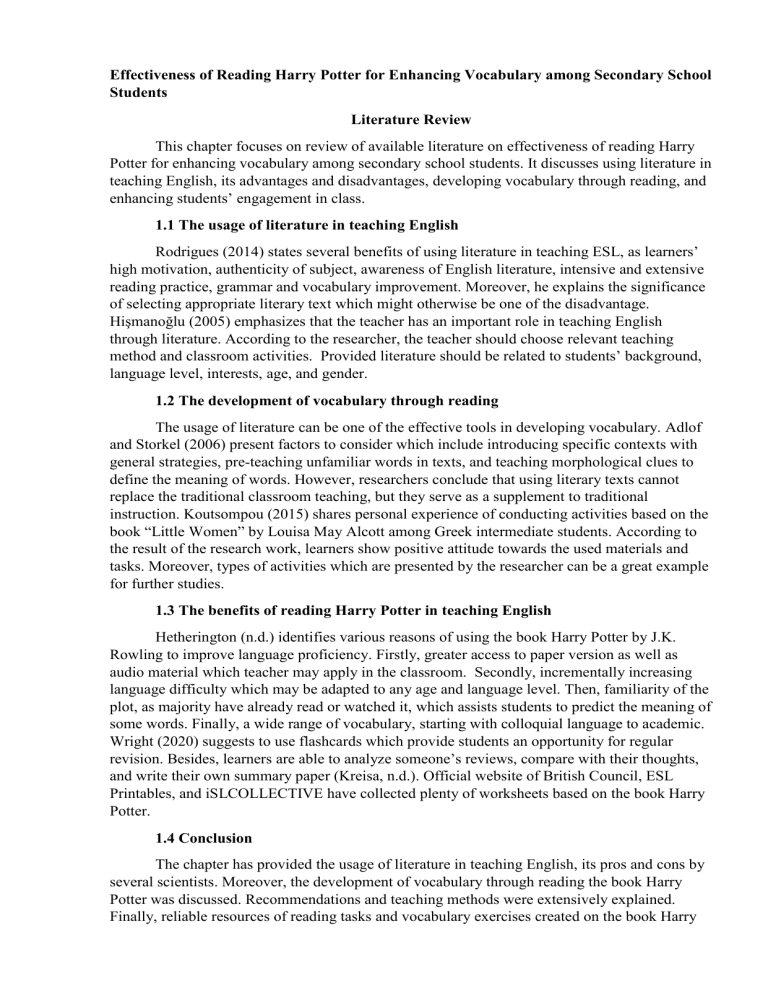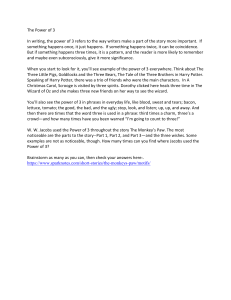
Effectiveness of Reading Harry Potter for Enhancing Vocabulary among Secondary School Students Literature Review This chapter focuses on review of available literature on effectiveness of reading Harry Potter for enhancing vocabulary among secondary school students. It discusses using literature in teaching English, its advantages and disadvantages, developing vocabulary through reading, and enhancing students’ engagement in class. 1.1 The usage of literature in teaching English Rodrigues (2014) states several benefits of using literature in teaching ESL, as learners’ high motivation, authenticity of subject, awareness of English literature, intensive and extensive reading practice, grammar and vocabulary improvement. Moreover, he explains the significance of selecting appropriate literary text which might otherwise be one of the disadvantage. Hişmanoğlu (2005) emphasizes that the teacher has an important role in teaching English through literature. According to the researcher, the teacher should choose relevant teaching method and classroom activities. Provided literature should be related to students’ background, language level, interests, age, and gender. 1.2 The development of vocabulary through reading The usage of literature can be one of the effective tools in developing vocabulary. Adlof and Storkel (2006) present factors to consider which include introducing specific contexts with general strategies, pre-teaching unfamiliar words in texts, and teaching morphological clues to define the meaning of words. However, researchers conclude that using literary texts cannot replace the traditional classroom teaching, but they serve as a supplement to traditional instruction. Koutsompou (2015) shares personal experience of conducting activities based on the book “Little Women” by Louisa May Alcott among Greek intermediate students. According to the result of the research work, learners show positive attitude towards the used materials and tasks. Moreover, types of activities which are presented by the researcher can be a great example for further studies. 1.3 The benefits of reading Harry Potter in teaching English Hetherington (n.d.) identifies various reasons of using the book Harry Potter by J.K. Rowling to improve language proficiency. Firstly, greater access to paper version as well as audio material which teacher may apply in the classroom. Secondly, incrementally increasing language difficulty which may be adapted to any age and language level. Then, familiarity of the plot, as majority have already read or watched it, which assists students to predict the meaning of some words. Finally, a wide range of vocabulary, starting with colloquial language to academic. Wright (2020) suggests to use flashcards which provide students an opportunity for regular revision. Besides, learners are able to analyze someone’s reviews, compare with their thoughts, and write their own summary paper (Kreisa, n.d.). Official website of British Council, ESL Printables, and iSLCOLLECTIVE have collected plenty of worksheets based on the book Harry Potter. 1.4 Conclusion The chapter has provided the usage of literature in teaching English, its pros and cons by several scientists. Moreover, the development of vocabulary through reading the book Harry Potter was discussed. Recommendations and teaching methods were extensively explained. Finally, reliable resources of reading tasks and vocabulary exercises created on the book Harry Potter were listed. However, lack of previous research studies demonstrates high relevance of the topic. Therefore, this research paper would affect positively in the improvement of vocabulary through literature, especially for fan community of Harry Potter. References


